Curious Savage (1962)
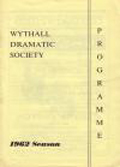
Date : March 1962
Director
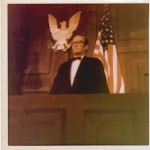
Roger Booth
Director
Cast

Peggy Foster
Ethel Savage
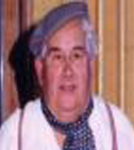
Ted Pedvin
Doctor

Eileen Ross
Miss Wilhelmina

Estelle Shutkever
Fairy May

Celia Grant
Florence
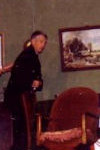
Gerry Smith
Hannibal
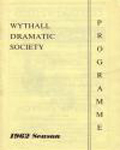
Curious Savage (1962)
Jeffrey

Anne Johnston
Mrs Paddy

Maurice Simpson
Savage Son
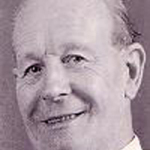
Jack Parramore
Savage Son

Brenda Castle
Lily Belle
Crew List information coming soon!
Production Gallery
Production Reviews
Hush-hush!
Redditch Paper January 11th , 1962
Reviewer Unknown
A Request for secrecy about the theme of their latest production-a comedy with the odd title of “The Curious Savage” – comes from Wythall Dramatic Society. Mrs. Peggy Osborne, of the society, tells me that the reason for secrecy is to let the audience work the theme out for themselves. The play, which is being produced by R. Keith Booth, will be staged on March 23 – and is “a very difficult one,” says Mrs. Osborne. During the cold spell the heating in the school where the society rehearse was turned off for a short time, adding to the difficulties of the play!
-----------------------------------------------------------------------
Wythall triumph on first night
Redditch Paper March 9th, 1962
Reviewer Unknown
Any doubts that Wythall Dramatic Society may have had about their ability to overcome the difficulties of presenting such a sensitive comedy as John Patrick’s “The Curious Savage”, were dispelled completely at the first night on Friday at Woodrush School.
Despite the fact that casting was completed only in mid-January, so there were only six short weeks to learn, interpret and perfect parts (and unwavering American accents), the cast could have given a more polished performance that they did on the first, testing performance.
The play has and odd setting, it is in a small, private mental home, discreetly called “The Cloisters”, in Boston, Massachusetts.
It is here that the three avaricious stepchildren of wealthy widow Ethel Savage (adeptly played by Peggy Foster) bring their philanthropic stepmother. She is, they explain hysterically to psychiatrist Doctor Emmett (Edward H. Pedvin), whittling away large chunks of the family fortune (which they hope to inherit) on the Johnathan Savage Memorial Fund.
The fund, it seems, has been set up by Ethel in memory of her late husband, to help herself and others to do all the foolish, impractical things that they could not otherwise do. She spends 200 dollars in bringing a box of Italian soil to a homesick Italian farmer in the States, she charters a liner to take school children round the world and – the last straw that threatens to break their bank – she fulfils her ambition to be and actress by financing a play that runs as a complete flop for a year.
Ethel, as she herself explains to the nurse, Miss Wilhelmina (played by newcomer Eileen Ross) is really tactful, practical woman; she shrugs off her wealth, “it doesn’t matter how much we have, we always remember the foolish things we never had.” Now that her husband is dead, she can do things that might have offended him while he was alive.
So Mrs. Savage tries to settle down as the sixth “guest” at the home. The other five, who live in their own dream worlds, believing that they are sane in an abnormal world, are so content to live their lives that way they want to live them that they can make use laugh at them.
Fairy May (exuberantly played by Estelle Shutkever) cannot accept that she is plain and unattractive, so she believes she is beautiful and invents and exciting an autobiographic background. Florence (Celia Grant) is quietly, portrayed as a young woman who clings to a shabby rag doll that she believes is Davy John, the son she does not have.
Gerald C. Smith plays Hannibal, a statistician whose failure as a mathematician prompts him to believe he is a musical virtuoso. Jeffery (Roger S. Mitchell) is a wartime bomber pilot who covers up his loss of nerve by imagining his face is disfigured by burns and he must spare people from seeing him.
Anne Johnston, as Mrs. Paddy, coped amazingly well with long, rhyming lists of her pet hates. Mrs Paddy hates everything so she never makes conversation (she does not like people) and she persistently turns out lights (she hates electricity).
Jack Parramore and Maurice Simpson handled their parts (as the two Savage sons) extremely well, and Brenda Castle gave just the right impression of the multiple divorcee stepdaughter, Lily Belle, who believes that diamonds, princes, or just plain million-dollar bonds, are a girl’s best friend.
Lesley Marshall must be compliment for dressing Mrs. Savage and Lily Belle with clothes that convince us they were wealthy and Noel Stimpson expertly introduced “mood music” to two scenes; this is something that many an amateur group either avoids or ruins, but Wythall ambitiously tried it – and succeeded.
George Cope must have worked ceaselessly to have synchronised his lighting effects with the erratic behaviour of Mrs. Paddy. He also made a success of the closing scene that was the personal touch of Keith Booth.
This was by no means and easy play to perform. The laughs were raised by well-timed wit and by the interpretation of the characters, which was the responsibility of the actors. Wythall deserved the large house it got. It also deserved the additional curtain call that it modestly denied itself!
-----------------------------------------------------------------------
A Play that has More than Comedy
Redditch Paper February 3th , 1962
Reviewer J.D.
Although there is some good comedy in John Patrick’s “The Curious Savage”, and Wythall Dramatic Society handle it reasonably well, it seems odd to describe the play as a whole as a comedy.
It deals, as one of the characters puts it, with people who “have taken refuge in an eggshell world where they don’t belong.”
They are mental patients, those who look after them and a curious quartet of the Savage family. But the play has a deeper meeting.
Mrs Ethel Savage (a difficult part extremely well tackled by Peggy Foster) is taken to “The Cloisters” by her family because they do not approve os her way of disposing of 10,000,000 dollars.
R. Keith Booth’s production, at Woodrush School, sounds and flows smoothly. Estelle Shutkever, as patients Fairy May, gives a sympathetic performances and Brenda Castle a rightly forceful one as Lilly Belle Savage.
-----------------------------------------------------------------------
‘Curious Savage’ With Ambition
Local Paper 1962
Reviewer: Paul Dunstan
Thank goodness amateur dramatic societies with a sense of ambition still exist in the Midlands.
There is a tendency these days – when in the happy position of being able to muster a capable band of actors – to present a play which is aimed purely and simply at “audience appeal.” Such a play, which rarely misses if well handled , would be a conventional “Who-dunnit” or a farcical comedy.
The audience member leaves the auditorium exhilarated by his evening’s entertainment - but does not give it another thought two hours after the fall of the curtain. Likewise, the actor is exhilarated but, if her has any conscience he will have a sneaking feeling that he was playing into the hands of the audience’ He may rest on his laurels and proudly accept his bouquets but, at some stag, he may well say: “That was a corny performance; the audience made it as good as it was.”
Good luck to the amateur society with a doubtful mixture of ability among its players. The members face facts, present a play with strong audience-appeal and nobody is any the wiser. I abhor the first-class society which repeatedly presents such a play, purely to maintain a standard.
Which is why members of the Wythall Dramatic Society who offered “The Curious Savage”, a three-act comedy by John Patrick last week, arte to be congratulated.
Superficially a comedy, “The Curious Savage”, has an undertone of pathos which escapes the unwary if the story is overplayed. Set in America, the play is about mental patients, their seemingly happy existence with the introduction of Mrs. Ethel Savage played by Peggy Foster. Labelled as “mental” by her family because the members do not approve of her methods of disposing of 10,000,000 dollars. Mrs Savage’s appearance brings added poignancy to the plot with here desire to live her own life.
Peggy Foster relaxed performance was a very creditable one. A blatant invitation to her to over-play and to hold the stage was dismissed with almost professional abandon.
One of the unfortunate “guests” at the Cloisters. Fairy May, played by Estelle Shutkever also gave a first-class performance. She provided a lively character bubbling with subtle insanity which balanced pleasingly with the character of her more morose colleagues in the home.
Roger S. Mitchell as Jeffery, the former U.S.A.A.F. pilot, had the looks and the build to carry off an effective character-study, but let it be said that his acting abilities did not let him down.
Brenda Castle as Lily Belle Savage the driving force behind Ethel’s introduction to the Cloisters mastered her part, and its intricacies of projection, with considerable skill.
Producer R. Keith Booth steered his cast well. The unavoidable difficulties of grouping on an excessively wide by shallow stage were no real reflection on his capabilities. Fewer straight lines of upwards of five characters at a time would have been welcomed, however.

